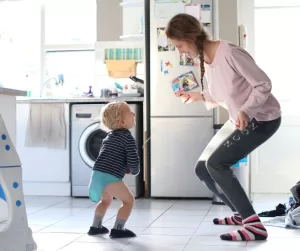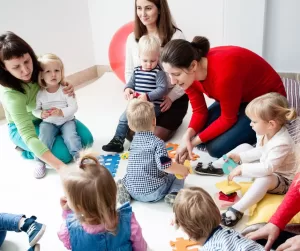 “My child is so ungrateful.”
“My child is so ungrateful.”
“Why can’t he ever appreciate anything?”
“She has no consideration for anyone but herself.”
Gratitude isn’t something to be taught but to be experienced. I’m coming to understand that gratitude is hard to come by without love. It’s hard to feel gratitude or consideration for others when one feels unloved or unlovable. As Mr. Rogers said, “All anyone wants is to feel loved and know they are capable of loving.”
Love must involve feeling unconditionally accepted for who you are. That is the work for all parents. Once you can accept your child for who he is—that means not sending the message you wish he were different, she was more like her sister, he can’t meet up to your expectations, there’s something wrong with her—you never need worry about whether this child will be grateful or considerate of others. It doesn’t mean accepting behavior. It does mean accepting that this child at this moment in time is behaving this way because she can’t help it—because she is having a problem.
I learned this a long time ago when my daughter, whose behavior was provoking power struggles between us daily, needed this acceptance from me.
 Right now I’m helping this daughter, mother of a 22 month old son, and a 1 week old daughter. I feel such gratitude when I see her giving her son the patience and acceptance he needs in this time of struggle for him. He gets some nos but mostly gets redirecting, choices, and understanding of what he is going through – even though she can’t know exactly what that is. Rather than expecting him to behave the way she wants because she is exhausted from birth and caring for a newborn, she looks to his needs first. As she does, he feels reassurance and has less bouts of intolerance.
Right now I’m helping this daughter, mother of a 22 month old son, and a 1 week old daughter. I feel such gratitude when I see her giving her son the patience and acceptance he needs in this time of struggle for him. He gets some nos but mostly gets redirecting, choices, and understanding of what he is going through – even though she can’t know exactly what that is. Rather than expecting him to behave the way she wants because she is exhausted from birth and caring for a newborn, she looks to his needs first. As she does, he feels reassurance and has less bouts of intolerance.
As I watch her giving him love and acceptance when it would be perfectly understandable if she lost it when he resists and demands, refuses and grabs, it fills me with assurance that this connective approach not only works in the moment but passes down thru generations.
I have been teaching this balanced, non-blaming, relationship-based approach to parenting for almost as long as my daughter has been alive. I say, almost, because for about five years of her young life I was at a loss. She came along four and a half years after my very delightful, easy-going son. In contrast, she was stubborn, resistant, and furious when she didn’t get her way. I fear I gave her messages of unacceptance many, many times before I got her. When I did, our relationship changed. She didn’t change, but I did. Instead of the tones of accusation along with the words that told her she was bad, I got it and was able to support her much better. Then she could relax. Our relationship improved dramatically, and I didn’t take her behavior personally anymore.
I was able to understand where even her worst behavior was coming from. She felt misunderstood and put upon. I didn’t need to change what she had to do, but my compassion for the difficulties she was having instead of thinking she was out to get me, made all the difference.
 Now I see her supporting her son without having to learn how to do it. It comes naturally to her. For this, I am extremely grateful, and I know the work I did with her will carry on.
Now I see her supporting her son without having to learn how to do it. It comes naturally to her. For this, I am extremely grateful, and I know the work I did with her will carry on.
As well, gratitude comes from modeling. Watching how it’s done over time is the lesson. But when you require it of children who don’t yet have the cognition to think outside of themselves and have a perspective of other people’s lives, children only feel blamed and wrong—for what, they have no idea. Blame always forces one inward to defense. When outward is what you are after, demanding gratitude and appreciation becomes counteractive.
Your child’s brain is focused on himself. He is hyper vigilant about what is going right or wrong in his myopic world. When she’s behaving as if the world has come to an end because she can’t find his train car or you have told her it’s time to put on her coat, there is no point in yelling that it’s no big deal. To her it is. You don’t have to turn the house upside down looking for the train car or stay home so she doesn’t have to put her coat on to have compassion for this experience. Just understand how serious it is to your child – right now. Then wait a minute.
The starving children in China syndrome that my generation was brought up on did no good in getting children to appreciate what they have. When you put an abstract idea on an ego-centric child you are virtually batting your head against a brick wall.
 Every adult who interacts with children must be accountable for the impact of words, jokes, and behavior on these formative minds. Accountability covers much more than being responsible for food, clothing, and shelter—and even love. It must include an understanding of how children’s minds work and how powerful words can be. Because of their immaturity, children hear words like, What is wrong with you? Why can’t you ever do what I ask? If you don’t get to bed, there will be no more TV, etc., and believe they are wrong or bad or powerless or unloved. We must learn how to give words of acceptance and respect even when we must correct behavior.
Every adult who interacts with children must be accountable for the impact of words, jokes, and behavior on these formative minds. Accountability covers much more than being responsible for food, clothing, and shelter—and even love. It must include an understanding of how children’s minds work and how powerful words can be. Because of their immaturity, children hear words like, What is wrong with you? Why can’t you ever do what I ask? If you don’t get to bed, there will be no more TV, etc., and believe they are wrong or bad or powerless or unloved. We must learn how to give words of acceptance and respect even when we must correct behavior.
Related Articles:







